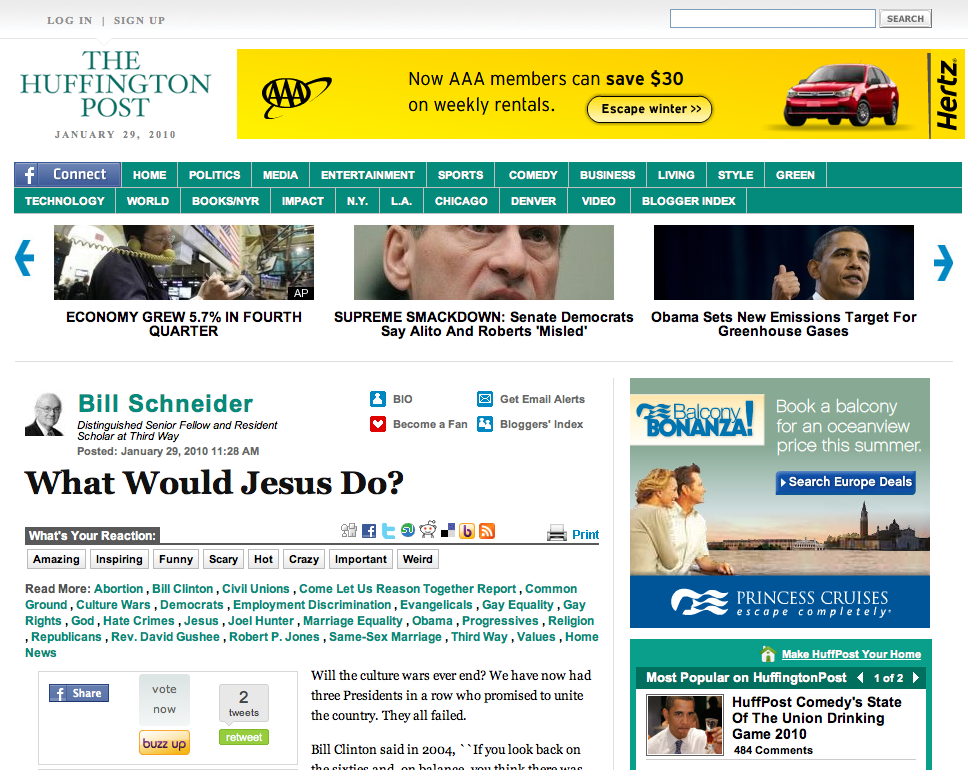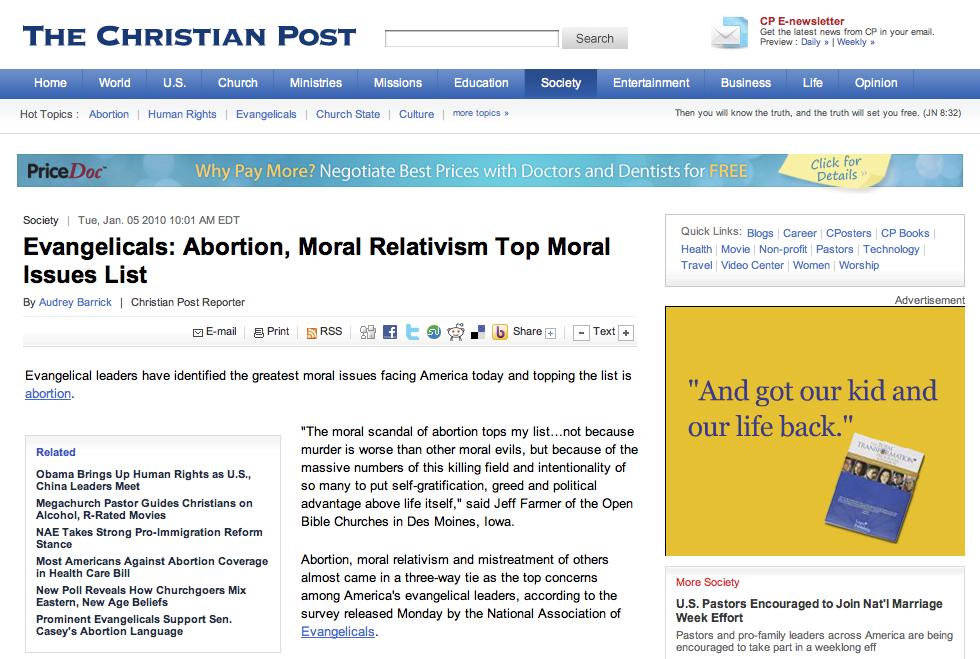What Would Jesus Do?
 By Bill Schneider, Distinguished Senior Fellow and Resident Scholar at Third Way
By Bill Schneider, Distinguished Senior Fellow and Resident Scholar at Third Way
Will the culture wars ever end? We have now had three Presidents in a row who promised to unite the country. They all failed.
Bill Clinton said in 2004, ``If you look back on the sixties and, on balance, you think there was more good than harm in it, you're probably a Democrat. And if you think there's more harm than good, then you're probably a Republican.''
The sixties were a long time ago. That was when China had a Great Proletarian Cultural Revolution and the United States had a Great American Cultural Revolution. China got over its trauma. The U.S. never did.
Why not? One word: religion. The United States experienced a ferocious backlash to the cultural changes of the 1960s. It's a backlash that happened nowhere else. It happened because of the uniquely powerful role of religion in American public life. Religious observance is now the defining political difference between Democrats and Republicans. Regular churchgoers vote Republican (55 percent for John McCain in 2008). Irregular churchgoers vote Democratic (60 percent for Barack Obama).
Can anyone heal the divide? A group of centrist evangelicals and progressives is trying. Their project is called ``Come Let Us Reason Together.''
A group of moderate evangelicals has joined forces with Third Way, a Washington think tank, (I should note here I am a Distinguished Senior Fellow & Resident Scholar at Third Way) ``trying to change the nature of our engagement in public debate in the United States,'' according to David P. Gushee, professor of Christian Ethics at Mercer University and president of Evangelicals for Human Rights.
``There's a real weariness of the politics of division,'' Robert P. Jones, president of Public Religion Research says. ``This project is about trying to find a politics of common ground.'' Jones estimates that 54 percent of white evangelicals in the U.S. can be described as ``centrist" (40 percent) or ``modernist'' (14 percent). Among younger white evangelicals, the total rises to 61 percent. These are churchgoing Americans who, Jones says, ``have increasingly found that the most loud and public voices in evangelical life are not speaking for them.''
In the past leaders who have tried to heal the cultural divide have taken two paths: either compromise or avoidance. But cultural issues are not easy to compromise. They're about values, not interests. Interests can be compromised. Values -- matters of right and wrong -- can not. In 1992, Bill Clinton said abortion should be ``safe, legal and rare.'' Anti-abortion forces believe abortion is murder. Should murder be ``safe, legal and rare''?
Barack Obama has followed the path of avoidance for the most part. In his first year, Obama hasn't said much about God, guns and gays, although his supporters believe he will eventually deliver. Same with immigration reform. The President says he will deal with it -- eventually.
``Come Let Us Reason Together'' recommends a different approach: common ground. According to Rev. Joel Hunter, senior pastor at Northland Church in Florida, ``There's a world of difference between compromise and cooperation. On the one hand, you are somehow giving up your agenda. On the other hand, you are even more likely to achieve your agenda through things that you can still do together. Each side is getting part of what they always wanted.''
Jones argues that what makes this effort unique is that ``it has put the more difficult issues front and center and tried to see what kind of conversations we can have about those, rather than pretending they're not in the room.''
Is there really common ground on abortion? The project's guide for pastors talks about reducing the number of abortions by preventing unwanted pregnancies and by supporting pregnant women who want to give birth. Surely progressives and evangelicals can agree on that.
Is there common ground on gay rights? The guide talks about protecting gays and lesbians from employment discrimination and hate crimes. Nothing about same-sex marriage. In Dr. Gushee's view, ``Civil unions don't seem to be a solution that is satisfying to a lot of people in either the gay community or the Christian community, but to me, it seems like it could be a space for common ground.''
The project is not looking for dramatic breakthroughs. It's promoting the experience of working together for shared values. Maybe they'll like it. Maybe they'll learn to trust each other a little more. ``We now have entire industries and organizations that profit from polarization,'' Dr. Hunter observed.
Can evangelicals be drawn away from the path of militancy? Dr. Gushee thinks they can because of the nature of their faith. He calls militancy ``a violation of our own values . . . where commitment to a certain position on an issue has overridden core teachings of our faith and the example of Jesus.'' Rev. Hunter says, ``I would like to build into the evangelical part of the church a broader approach to controversial or divisive issues so that we can both be peacemakers and advance those values that we think are biblical values.''
Doesn't the Bible say, ``Blessed are the peacemakers, for they shall be called the children of God''?
Find this article at: http://www.huffingtonpost.com/bill-schneider/what-would-jesus-do_b_441944.html


